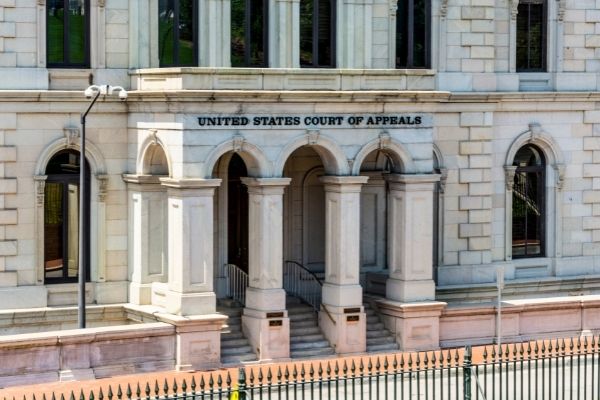Top Federal Crime Lawyer: Specialized Legal Protection for Federal Offenses
Top Federal Crime Lawyer: Specialized Legal Protection for Federal Offenses
Blog Article
Debunking the Process of Federal Appeals: What You Required to Know
Navigating the elaborate realm of government allures can often feel like going across uncharted waters for those unfamiliar with the process. Comprehending the subtleties of appellate court jurisdiction, the ins and outs of submitting a notification of allure, presenting a compelling brief, and making an influential dental debate are important parts that can dramatically influence the result of a case. By unraveling the layers of intricacy surrounding government charms, people can obtain a clearer understanding into the mechanisms that control this essential phase of the legal system.
Recognizing Federal Appeals Process
Exploring the elaborate world of the federal appeals process reveals a structured and systematic trip with the judicial system. Federal appeals offer as an important mechanism for assessing decisions made by reduced courts. Understanding this procedure is vital for anybody entailed in legal procedures at the government level.
The process usually starts with a celebration dissatisfied with a reduced court's judgment filing a notice of appeal. This sets off a testimonial by a greater court, where a panel of judges examines the lawful debates offered by both events. Briefs detailing the lawful thinking behind each party's position are sent, and dental debates may be heard to clear up complex issues.
The appellate court's choice is based on a thorough assessment of the lower court's procedures and the debates provided. When the appellate court gets to a choice, it can attest, turn around, remand, or modify the lower court's ruling, giving quality and finality to the legal disagreement.
Appellate Court Jurisdiction Described
Appellate court jurisdiction refers to the scope of instances that a particular appellate court has the power to examine and choose upon. Unlike trial courts that listen to cases for the first time, appellate courts are limited to evaluating decisions made by reduced courts.
Appellate courts have territory over specific kinds of instances, generally those involving lawful errors, procedural problems, or concerns of legislation instead than accurate disagreements. The territory of appellate courts is normally outlined in statutes and legislations that govern the court system. Comprehending appellate court jurisdiction is important for events involved in the allures procedure as it determines whether an instance is eligible for review and the extent to which the appellate court can intervene in the reduced court's decision.
Declaring a Notification of Charm
The initial action in beginning the government charms process involves filing a Notice of Allure with the suitable appellate court. This important document officially alerts the court and the other celebrations associated with the case that the appealing event intends to look for a testimonial of the reduced court's decision. Filing a Notification of Charm is a rigorous step-by-step need that establishes the appellate procedure in movement.
When preparing the Notice of Charm, it is vital to make certain conformity with the particular regulations and standards of the relevant appellate court. federal appeal attorneys. The document should generally include information such as the case name, the lower court's name, the day of the judgment being appealed, and a concise declaration suggesting the premises for the allure

Briefing and Dental Disagreement
In the appellate process, offering created briefs and taking part in dental debates play pivotal duties in supporting for the appealing party's setting prior to the appellate court. Briefs are detailed lawful records that describe the celebrations' debates, lawful authorities, and analysis supporting their positions. These written submissions supply the court with an in-depth understanding of the facts of the case, the pertinent regulation, and why the appealing celebration thinks the reduced court's choice need to be reversed.
Complying with the submission and testimonial of the briefs, oral arguments provide the parties an opportunity to additional clarify their positions, address any kind of questions the appellate courts might have, and highlight crucial factors from their composed briefs. Oral debates are an opportunity for the lawyers to persuade the judges with spoken campaigning for and actions to inquiries from the bench.
Both the written briefs and oral disagreements are essential elements of the appellate procedure, enabling parties to present their situation extensively and compellingly before the appellate court. - federal appeal lawyers
Getting the Appellate Court Decision
Upon conclusion of oral disagreements and submission of created briefs, the next crucial phase in the appellate process includes awaiting the crucial judgment from the appellate court. This period of anticipation can be loaded with a mix of stress and anxiety and expect parties associated with the allure. The appellate court's choice is generally supplied in a created style and lays out the court's final thoughts on the legal issues presented, the reasoning behind their decision, and the judgment made. The time structure for receiving the appellate court's decision can vary, yet courts strive to supply prompt resolutions. When the choice is released, parties have to carefully examine the court's ruling to recognize the end result and figure out any further steps that may be essential. Whether the appellate court verifies, turns around, or remands the reduced court's choice, comprehending the ramifications of the judgment is critical for all celebrations entailed in the appellate process. Consequently, quickly assessing and understanding the appellate court's choice is important in browsing the following actions in the legal procedures.
Verdict
Comprehending the appellate court territory, filing a notice of appeal, preparing briefs, and providing oral arguments are all crucial parts of this procedure. Eventually, receiving the appellate court choice can give quality and resolution to lawful conflicts.
As we proceed from understanding the federal allures procedure to studying the complexities of appellate court territory, an essential aspect comes to light relating to the authority and limitations of these greater courts in the lawful landscape. Appellate court territory refers to the scope of situations that a specific appellate court has the power to examine and make a decision upon. Unlike trial courts that listen to instances for the very first time, appellate courts are limited to evaluating decisions made by lower courts. Comprehending appellate court territory is vital for celebrations entailed in the appeals process as it identifies whether a case is qualified for testimonial and the level to which the appellate court can More about the author intervene in the lower court's choice.

Report this page